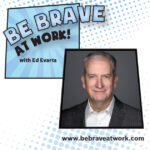
by Ed Evarts | Sep 27, 2017 | Interacting, Relationships, Reputation, Visibility and Value
The nexus of the growth in the ways that you can share information about yourself and the number of opinions that can be developed about you is exploding. While you are working your life away in Dubuque, Iowa, a colleague from another city is reading a blog you wrote....

by Ed Evarts | Sep 20, 2017 | Interacting, Relationships, Reputation, Visibility and Value
Imagine a situation where you are attempting to be a “work-in-progress” in an environment that is always changing. It’s like learning to play golf in the midst of a hurricane. Learning to play golf is hard, even on a beautiful day. Surviving a hurricane is hard, even...

by Ed Evarts | Sep 13, 2017 | Interacting, Relationships, Reputation, Visibility and Value
While the importance of a good reputation is not new, the environment in which you are working to build a good reputation is. Twenty years ago, your reputation as a business professional was confined to the experiences of individuals with whom you interacted within...

by Ed Evarts | Sep 6, 2017 | Interacting, Relationships, Responsiveness, Visibility and Value
I am working with a client who does not like the relationship she has with her boss. Not having a great relationship with your boss is a very common experience and this is important because the most important relationship you have in your workplace is with your boss....










